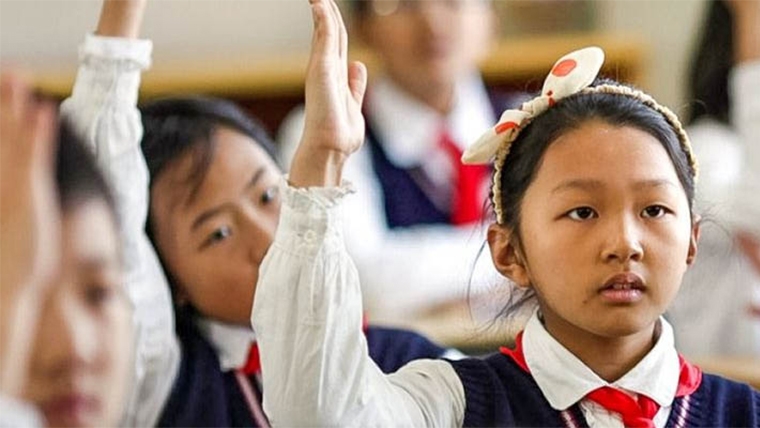
By Mark Tanner*
It can be tough being a kid in China. On top of going to school and learning about DNA-editing technologies from the age of six, the average 3-15 year old student spends 31 hours a week doing homework and extracurricular classes. And the summer holidays offer no respite, with 58% of children registered in extracurricular classes according to a 2019 study.
Education in China has only become more important as many parents strive for increasingly higher definitions of success and achievements in the competitive world of 1.4 billion people. Although millennial parents are becoming more rounded in their perception of what childhood should look like, much of it feeds into an underlying motivation to score highly in the gruelling gaokao exams, which ultimately determines their university pathway.
Parents place immense pressure on their children and themselves to bolster that gaokao score. It has seen parents do whatever they can to buy an apartment in the right school zones, and force-feed their kids with a diet of homework, tutoring, and after school sports, music and art - a term affectionately known as 'chicken parenting'. For kids, the constant study results in almost 40% needing glasses by the age of 10, rising to over 80% by the time they finish high school. It is believed to be linked with Chinese kids being 28% more likely to be obese than they were five years ago.
The pressure for academic success has played a part in 25% of Chinese adolescents suffering from depression, versus 13% of their American peers. As the kids grow into young adults, the immense societal expectation to succeed has led to a counter culture of self-professed 'losers' or Diaosi. A somewhat related trend has come from youth exhausted by a culture of hard work with seemingly little reward who push for a lifestyle change by "lying flat".
These numbers and cultures clearly aren't pleasing the powers in Beijing. This isn't just because they are looking out for the wellbeing of the populace, but also because this has contributed to over two-thirds of couples reluctant to bring more than one child into the world. Hence we have the well-publicised baby drought that is impacting China's demographic balance, competitiveness and happiness. The stark reality is that nearly a sixth of China’s children and teenagers will have no brothers, sisters, uncles, or aunts by 2050.
The Government is pulling many levers to increase the attractiveness of parenting. One of the significant initiatives happening at present is a genuine crackdown on China's extracurricular industry. A new department, new laws and tighter regulations are being aimed at private education companies that offer tutoring services to create more barriers for parents, and ultimately decreasing societal pressure for children to do the tens of hours of extracurricular activities every week. Beijing has also set limits on the amount of homework that can be given, and is exploring solutions for school zone pressures. There are even calls to reward parents with ¥1 million ($155K) for having a bub.
Brands would be wise to take note of the pressure on parents and children in China, and also Beijing's motivations to find solutions for these pressures. Marketing anything from sports to food to experiences, are likely to sell a lot better if they connect emotionally to the societal challenges and if parents think that they will improve their kids chance of success. The challenges are unlikely to go away any time soon, so plan for the long run.
Mark Tanner is the CEO of China Skinny, a marketing consultancy in Shanghai. This article was first published here, and is re-posted with permission.
17 Comments
I was one of them and really enjoyed the whole study experience.
it was hard but made you a better person.
i may achieve something 10 times faster than my NZ peers do.
Dear Xingmo,
I do not want to be rude, but in being brutally honest, my comment may seem that way.
You come across as a highly indoctrinated fool.
Regards
Timmyboy
you probably would be as 'indoctrinated' as me if you had the chance to master both Chinese and English, lived both cultures for decades, and watched news from both worlds.
are u?
Timmy gets nervous just eating ethnic food.
Especially bats :)
You should try the Bamboo Rats. They are to die for!
ditto that!
sounds unconventional but tastes like something should be served to the God each dinner.
Kiwis are problem solvers and the West is the best.
xingmowang is an algorithm.
When I remember my own childhood I feel sad for the kids. Personally I was not the least bit concerned in or engaged in education until the 4th form, just got the basics, arithmetic, reading and writing, and social studies. From then on I engaged and progress was rapid. I have seen similar and even more pronounced examples of this. One pretty much skipped high school and went on to achieve very highly academically and professionally. Another was all geared up for his apprenticeship because he did not do well at high school but went on to receive his Phd. Another was home schooled in a very open ended exploration of what interested him but missed out on a lot of stuff. Now working full time as a lecturer and will concurrently complete his Phd in 3.5 years. I could go on, but the message is that trying to squeeze a whole lot of stuff into kids when they are not ready or engaged may not be necessary and may well end up counterproductive. A sound grounding in the basics is probably all that is required. Excellent secondary and tertiary tuition will provide what is required at a stage when kids are receptive and not turned of by a bunch of bungled learning when they are too young.
I suppose that all this pressure and reduction in birthrate could be viewed as good thing and a social adaption to over population.
Yes, one hopes the reduction will be in time, but given human lifespans, that seems implausible.
I left before Uni, apprenticed, quit, worked-to-live - then self-educated. Never regretted avoiding the siloing.
It is all about reaching a balance. My children are academically gifted, but NZ does not have an adequate system to support gifted children, at least in the primary education system. The system worries about other "normal" children's feelings too much. On the other hand, it is not hard for adults to re-enter the education system if determined. Asian countries are normally the opposite. it is all relevant.
My children are gifted. Course they are mate, course they are.
We're going the other way in New Zealand. Dumbing down education and turning hobbies into high school subjects, thereby bolstering the pass rate for political reasons.
Will be interesting to see the payoff of the different strategies in 25 years.
You can get NCEA credits for snowboarding now.
To many Chinese, the population pressure will be the main drive for emigration nowadays, even if they are truly not aware of it, or refuse to admit it. China has nearly 9 million university graduates this year. When you have that many people, you have less chance to share the pie. It is a simple statistical matter. My friend once sent her kid to a private primary school interview in Shanghai, the little one was there to compete against the other 4500 children, yet only 250 of them would make it. She ended up taking her family to Canada in 2018. In recent years, we see many Chinese in their late 20s or early 30s migrating to NZ with their young family. They brought wealth and skillsets (mainly ICT) into the country. To many of them, the fundamental rationale is the same as my friend's. It is the same with the Indians too.
To quote the War Room "Lets take down the CCP"!

We welcome your comments below. If you are not already registered, please register to comment
Remember we welcome robust, respectful and insightful debate. We don't welcome abusive or defamatory comments and will de-register those repeatedly making such comments. Our current comment policy is here.